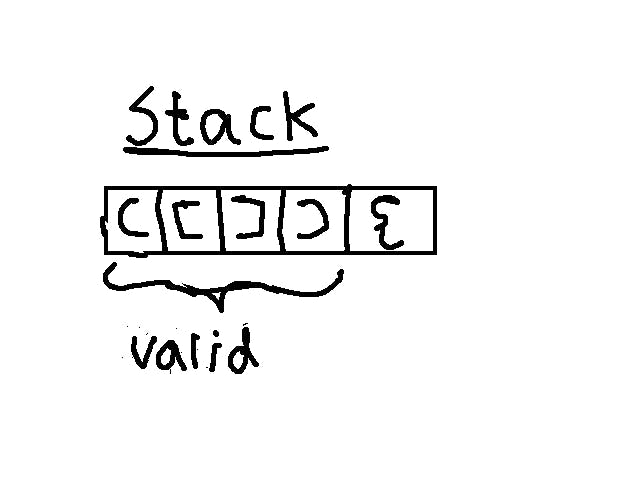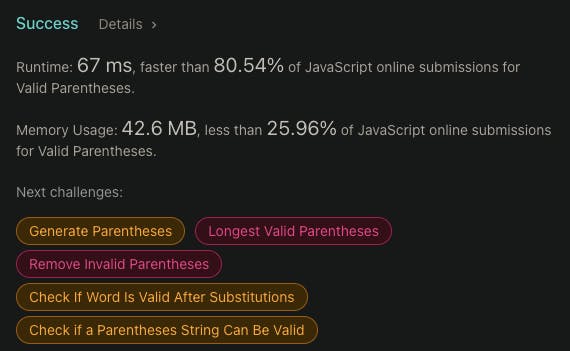Valid Parentheses Using Javascript - LeetCode Challenges
Leetcode Problem Question
Updated On: Sept 15, 2023
Main things to note
Object We're using Object to save the opening and closing of the parentheses
Stack As you know stack works in a LIFO (Last In First Out) manner. So, you can get the last parenthesis you added and then match it with the object value.

Javascript Solution
/**
* @param {string} s
* @return {boolean}
*/
var isValid = function(s) {
let parenthesesMap = { ')': '(', '}': '{', ']': '[' };
let stack = new Stack();
//With Mapping
for (let index = 0; index < s.length; index++) {
const element = stack.getPopItem();
if (Object.values(parenthesesMap).includes(s[index])) {
stack.push(s[index]);
}
else if ((element === parenthesesMap[s[index]])) {
stack.pop();
} else return false;
}
// if Stack has value that means some open parenthesis are there
return (stack.isEmpty()) ? true : false;
};
const s = "()[{]"
console.log(isValid(s));
class Stack {
constructor() {
this.items = [];
}
peek(){
this.items.shift();
}
push(element){
this.items.push(element);
}
//Get the last digit
pop(){
// console.log(this.items);
return this.items.pop();
}
isEmpty(){
return (this.items.length === 0)? true:false;
}
printStack(){
console.log(this.items);
}
getSize(){
return this.items.length;
}
getPopItem(){
return this.items[this.items.length -1];
}
}
Leetcode Result

Another Solution
If you're looking for an alternate coding solution. Please check the below. I am also adding the description I got from ChatGPT (this looks good to read :) )
function isValid(s: string): boolean {
if(s.length ==1) return false;
const brackets = {
'(':')',
'[':']',
'{':'}',
}
const vals = s.split("");
let stackArr = [];
for (const val of vals){
//If stackArr val is ( )
let stackArrLength = stackArr.length-1;
if(val != brackets[stackArr[stackArrLength]]) {
stackArr.push(val);
continue;
}
stackArr.splice(-1); //remove last item from array;
}
if(stackArr.length >0) return false;
return true;
};
Here's a step-by-step description of the code:
Input Validation:
The function begins by checking if the input string s has a length of 1. If it does, it immediately returns false. This check ensures that single characters cannot be considered valid bracket expressions.
Brackets Mapping:
The code defines an object named brackets to map the opening brackets to their corresponding closing brackets. This mapping includes ( to ), [ to ], and { to }. This mapping is crucial for later bracket matching.
String Splitting:
The input string s is split into an array of characters named vals. This array will be iterated over to process each character in the input string.
Stack Initialization:
An empty array named stackArr is created. This array will be used as a stack to keep track of the opening brackets encountered in the input string.
Bracket Matching Loop:
The code enters a loop that iterates through each character (val) in the vals array.
In summary, the code utilizes a stack data structure to keep track of opening brackets and checks if the input string contains a valid bracket expression by ensuring that all opening brackets are correctly closed in the right order. If the brackets are properly balanced and nested, the function returns true; otherwise, it returns false.